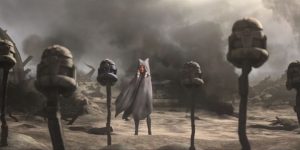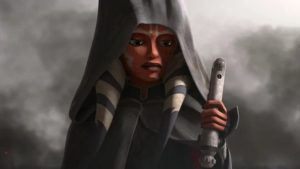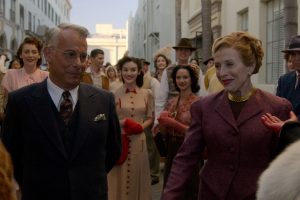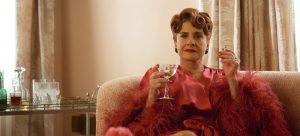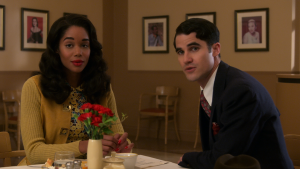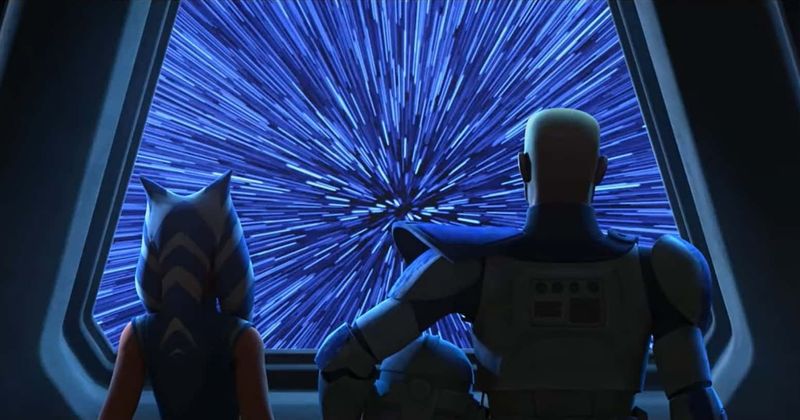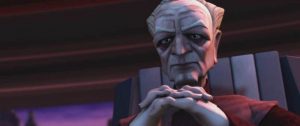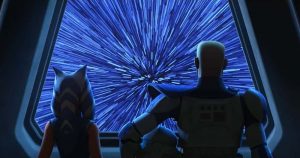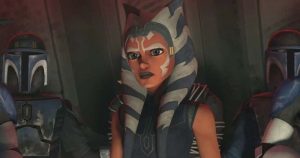The Secret Invasion saga is a Marvel comics storyline that many fans have been asking to see depicted on the big screen since it was revealed that Captain Marvel would introduce the story’s chief antagonists, the Skrulls, into the Marvel Cinematic Universe alongside their nemeses, the Kree. But it seems that, while the repercussions of the storyline will probably be felt in the films, much or even the entirety of the Secret Invasion saga will occur exclusively on Disney+, in the form of a new series for the streaming service, according to a new rumor.
That means that the details of the story will have to be changed for the MCU adaptation, because the scale will likely be far smaller – but that doesn’t come as too much of a blow, because we already knew that the storyline would have to be changed a lot after Captain Marvel revealed that the Skrulls were actually a largely peaceful people of exiled refugees, rather than the diabolical shape-shifting troublemakers they are in the comics. We actually have yet to meet any evil Skrulls in the MCU, though for a Secret Invasion storyline to work, there will have to be some: the whole premise revolves around a group of Skrulls led by the conniving queen Veranke, infiltrating earth by disguising themselves as prominent government officials and superheroes. In the comics, this story sprawls across the entire Marvel universe: it’s still possible that could work in the MCU as well, but we now know that the main characters standing in the way of Veranke (or whoever leads the Invasion in this adaptation) will be the Agents of S.W.O.R.D.
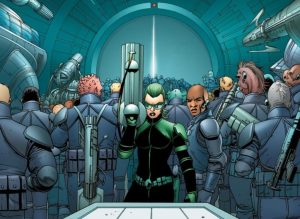
S.W.O.R.D., also known as the Sentient World Observation and Response Department, made what was almost certainly its MCU debut last year in an incredible Spider-Man: Far From Home post-credits scene which showed former S.H.I.E.L.D. director Nick Fury leisurely strolling around the hallways of a massive space-station manned by benevolent Skrull and human workers, while simultaneously giving orders to Skrull operatives Talos and Soren, who were posing on earth as Fury and his assistant Maria Hill, respectively. Since then we’ve also been given evidence to suggest that S.W.O.R.D. will have a large presence in the WandaVision Disney+ series. Now, it looks like the agents of S.W.O.R.D. will be getting their own series, in which we may be able to explore the inner workings of their organization, and fully understand their various responsibilities as protectors of earth against cosmic and extraterrestrial threats.
Obviously, we already have an Agents Of S.H.I.E.L.D. series, and it’s quite good, so it does seem likely that at least part of the inspiration for this Secret Invasion story was borrowed from that MCU-adjacent TV program, which is set to premiere its seventh and final season this very month. In the MCU, S.H.I.E.L.D. ceased to exist several years ago, and the TV series, while popular with a small and devoted fandom (including myself), has drifted further and further away from MCU canon with each successive season. So, despite how unfair it is, there likely won’t be any reference made to the agents of S.H.I.E.L.D. or their many exploits across space and time (though if there is, I have a few ideas for how they could be implemented into a Secret Invasion storyline, which I’ll discuss).
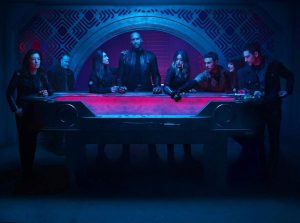
Barring a surprise cameo in Black Widow or The Falcon And The Winter Soldier, S.W.O.R.D.’s first official appearance is likely to come in WandaVision – which, on the surface, seems like a strange place to introduce a group of space-based characters whose mission involves fighting aliens. But the tie-in to Wanda Maximoff’s multiverse adventure probably comes through the character of Hulkling, a half-Skrull, half-human superhero and member of the Young Avengers, who is the boyfriend of Wanda’s son Wiccan and is already rumored to appear in the WandaVision series. While he may not yet be a full-fledged agent in the series, his status as a bridge between humans and Skrulls makes him a key player in the relationship between the two peoples and, occasionally, a pawn in their politics. Certain members of the WandaVision cast, most notably Monica Rambeau and Thor fan-favorite Darcy, are also presumably more closely linked to S.W.O.R.D. than to Wanda herself – as a child in Captain Marvel, Rambeau was shown to have developed a close connection with the Skrulls and her comics counterpart is a cosmically-powered superheroine, while Darcy is an intrepid scientist specializing in the study of astrological abnormalities, a niche talent that came in handy in Thor: The Dark World and could make her an invaluable member of the S.W.O.R.D. team.
So already we have at least three characters who could easily be introduced as S.W.O.R.D. members who find themselves caught in the middle of Wanda Maximoff’s inner turmoil – perhaps due to Hulkling’s relationship with Wiccan, perhaps for another reason: it’s even possible that Wanda’s attempts to scramble the multiverse might endanger the earth, leaving it vulnerable to alien hostiles, something which could easily make her a target for S.W.O.R.D., though if that’s the case it’s hard to imagine why someone else, with a better understanding of the threat, wouldn’t be sent to deal with her instead. Again, I’m thinking Darcy’s experience with the Convergence incident could prepare her for dealing with this event, which might similarly feature a powerful and dangerous character trying to open a portal between worlds – though in this case, it would be Wanda, and her motives would be more sympathetic than Malekith’s.
The Secret Invasion series will most likely follow soon after – “soon” being a relative term in this case, considering that nothing is going to be happening truly soon with coronavirus still posing a threat to any filming in the foreseeable future. It is said to lead into the events of Captain Marvel 2, and could potentially feature a crossover with a Young Avengers series on Disney+, again because of Hulkling, who is a prominent member of that superhero team. Let’s start wildly theorizing now, shall we?
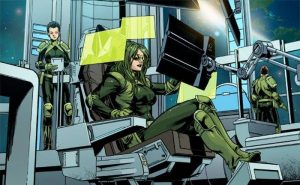
My guess is that the Secret Invasion series will start out with the core S.W.O.R.D. team already firmly established, having been assembled by Nick Fury prior to the events of Spider-Man: Far From Home but only just now emerging as a force to be reckoned with in the MCU. Apart from Hulkling, Monica Rambeau and Darcy, the team will be headed by a group of powerful individuals including Nick Fury, Maria Hill, Talos and Soren, and Monica’s mother Maria Rambeau, who was last seen in Captain Marvel, where she was Carol Danvers’ best friend and helped the heroine protect the Skrulls from an entire Kree army. The team’s commander in the comics, mysterious green-haired Abigail Brand, will also serve in a key leadership position. In the comics, a number of notable cosmic characters also stop in for guest appearances – some we’ve already met in the MCU like Captain Marvel, Peter Quill and Gamora; some we haven’t, like Thor’s long-lost half-sister Angela, and the bizarre alien warrior Beta Ray Bill. If we’re lucky, certain S.H.I.E.L.D. members might also make the jump to space, like Daisy Johnson, Melinda May, or the FitzSimmons duo: there are already rumors that Johnson, an Inhuman, could make a cameo in the Ms. Marvel Disney+ series, which will star another Inhuman character – if that is the case, I wouldn’t rule out Johnson and even Ms. Marvel showing up as part-time S.W.O.R.D. allies.
The plot of the series will revolve around this team of characters working on the space station known as The Peak when the Skrull invasion occurs. The invasion itself will be led by Veranke, and could be motivated for a number of reasons: it’s possible Hulkling could have something to do with it, and that the fight breaks out over him, but he’s already getting a lot of attention, so I’d rather that Veranke be inspired to attack earth when she hears of the secret Kree sleeper agents already established on the planet – these agents were briefly mentioned by Talos in Far From Home, in a manner that felt very significant. This way, Veranke and her Skrulls are inherently fighting for a good cause, but they’re also positioned as enemies to S.W.O.R.D., who will of course want to defend earth and deal with the Kree in their own way. If Marvel really wants to rip off Agents Of S.H.I.E.L.D., they could even have Veranke be a S.W.O.R.D. member herself, who betrays the organization, though in this case she could do so because she feels like her and her peoples’ concerns are being ignored. She might also try to get Hulkling to join her on her mission, which could give his character a fascinating dilemma but doesn’t make him the chief focus of a Secret Invasion storyline.
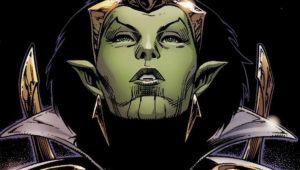
Of course, there would have to be some shape-shifting happening, or what would even be the point of a Secret Invasion? In the comics, Veranke herself takes the form of Spider-Woman, but Sony owns the rights to that character and is unlikely to want to stick her in a Disney+ series. Besides which, Veranke impersonating Spider-Woman only works if Spider-Woman is already an established and trusted character in the MCU, which she isn’t. And beyond that, the scope of this series will probably be far smaller than it would be if it were a film – meaning that whoever Veranke does impersonate will probably be someone like Nick Fury, or someone else in the core S.W.O.R.D. team, rather than a big-name Avenger.
In the comics, The Peak is destroyed during the Secret Invasion by a Skrull posing as “Dum Dum” Dugan, a character who has long been deceased in the MCU and thus will have to be replaced. Abigail Brand and a few other agents will, as in the comics, escape the annihilation of their headquarters with the help of emergency space-suits (though, as this event will likely happen at the end of the series, this could be a fitting place to kill off certain characters, even fan-favorites like Talos, who presumably wouldn’t have a large place in the MCU after a Secret Invasion storyline anyway). They will be saved by Monica Rambeau – who basically has to have gained her own superpowers and adopted the Photon mantle by that point, right? – and Captain Marvel, who could show up as a finale guest star. Having Captain Marvel there also sets up the events of her sequel film, in which she may have to team up with the remaining S.W.O.R.D. agents to take down both Veranke and the Kree’s Supreme Intelligence, which is still a considerable threat to the security of the galaxy.
After this story is concluded, I imagine we’ll continue to see the S.W.O.R.D. team in the MCU: Rambeau, thanks to her similar set of powers, can easily become Carol Danvers’ sidekick, and Hulkling will join the Young Avengers as a full-time member. It’s also worth noting at this point that the finale of this series has the potential to introduce – or at least tease – both the X-Men and the Fantastic Four. Mutants such as Lockheed the dragon and Hank McCoy both serve under Abigail Brand as agents of S.W.O.R.D., and Brand runs into Mister Fantastic while he’s being held prisoner on a Skrull starship after the destruction of The Peak. If either of these things happens in the series, even near the end, it has the potential to be the next big MCU crossover event.
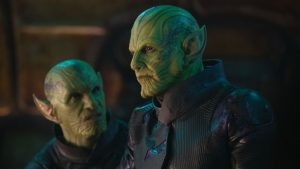
So that’s what I think of a Secret Invasion/Agents Of S.W.O.R.D. series, and how it could work. These are all just my personal theories and educated guesses: nothing based in substantial fact. This whole story is also only a rumor at this point – nothing has even been confirmed by Disney, so it’s possible I’m moving too quickly. Nonetheless, I’m very interested to hear what you have to say on the matter, so be sure to share your thoughts, theories and opinions in the comments below!

